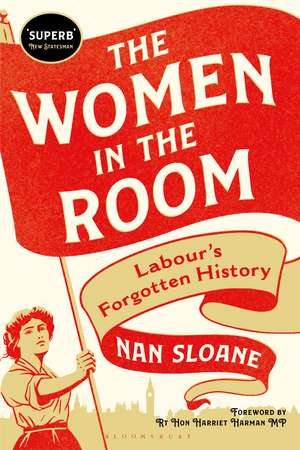The Women in the Room: Labour’s Forgotten History
Autor Nan Sloaneen Limba Engleză Paperback – 18 mai 2022
| Toate formatele și edițiile | Preț | Express |
|---|---|---|
| Paperback (1) | 70.67 lei 3-5 săpt. | +59.18 lei 7-13 zile |
| Bloomsbury Publishing – 18 mai 2022 | 70.67 lei 3-5 săpt. | +59.18 lei 7-13 zile |
| Hardback (1) | 205.15 lei 3-5 săpt. | |
| Bloomsbury Publishing – 29 sep 2018 | 205.15 lei 3-5 săpt. |
Preț: 70.67 lei
Preț vechi: 111.06 lei
-36% Nou
Puncte Express: 106
Preț estimativ în valută:
13.52€ • 14.19$ • 11.22£
13.52€ • 14.19$ • 11.22£
Carte disponibilă
Livrare economică 20 martie-03 aprilie
Livrare express 06-12 martie pentru 69.17 lei
Preluare comenzi: 021 569.72.76
Specificații
ISBN-13: 9781350340824
ISBN-10: 1350340820
Pagini: 280
Ilustrații: 12 bw illus
Dimensiuni: 156 x 234 x 17 mm
Greutate: 0.46 kg
Editura: Bloomsbury Publishing
Colecția Bloomsbury Academic
Locul publicării:London, United Kingdom
ISBN-10: 1350340820
Pagini: 280
Ilustrații: 12 bw illus
Dimensiuni: 156 x 234 x 17 mm
Greutate: 0.46 kg
Editura: Bloomsbury Publishing
Colecția Bloomsbury Academic
Locul publicării:London, United Kingdom
Caracteristici
Brings together the work of women in the Trade Union movement, the suffrage campaigns and the early Labour Party
Notă biografică
Nan Sloane is the Director of the Centre for Women and Democracy. She is Training Coordinator of the Labour Women's Network, a former Labour councillor and Regional Director of the Labour Party. She is currently a member of Fawcett Society's 'Does Local Government Work for Women' Commission. She is the author In Our Own Words: A Dictionary of Women's Political Quotations; A Great Act of Justice: The Flapper Election and After and lead author of Sex & Power 2014: Who Runs Britain?
Cuprins
IntroductionAcknowledgementsOne: Trade UnionistsTwo: SocialistsThree: FoundationsFour: 'The Men's Party'Five: Women's WorkSix: BreakthroughSeven: Suffrage and SweatingEight: ChangesNine: The Great UnrestTen: War and PeaceEpilogueTimelineThe Women in the RoomOrganisations and AcronymsBibliographyNotesIndex
Recenzii
A truly worthy, long-overdue and brilliantly written tribute to the women who helped drive the rise of British socialism.
[W]hen Sloane can muster sufficient detail to weld the personal to the political, her story is fascinating. ... Heartening as such stories may be, Sloane is also an unsparing chronicler who never glorifies her campaigners as a seamless sisterhood.
[...] Sloane succeeds throughout in offering a fresh and engaging account of the complex of organizations, debates and initiatives that contributed to Labour politics in the late nineteenth and early twentieth centuries.
[A] detailed history ... By 1918 some of the women who had worked with untiring commitment had died, others lived on to occupy high profile positions in the labour movement. Sloane's account successfully repositions their efforts and achievements.
[W]hen Sloane can muster sufficient detail to weld the personal to the political, her story is fascinating. ... Heartening as such stories may be, Sloane is also an unsparing chronicler who never glorifies her campaigners as a seamless sisterhood.
[...] Sloane succeeds throughout in offering a fresh and engaging account of the complex of organizations, debates and initiatives that contributed to Labour politics in the late nineteenth and early twentieth centuries.
[A] detailed history ... By 1918 some of the women who had worked with untiring commitment had died, others lived on to occupy high profile positions in the labour movement. Sloane's account successfully repositions their efforts and achievements.
